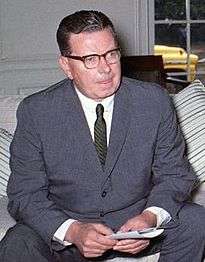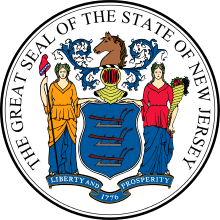Richard J. Hughes
| Richard Joseph Hughes | |
|---|---|
|
Hughes in 1962 | |
| 45th Governor of New Jersey | |
|
In office January 16, 1962 – January 20, 1970 | |
| Preceded by | Robert B. Meyner |
| Succeeded by | William T. Cahill |
| Chief Justice of the New Jersey Supreme Court | |
|
In office 1973–1979 | |
| Preceded by | Pierre P. Garven |
| Succeeded by | Robert N. Wilentz |
| Personal details | |
| Born |
August 10, 1909 Florence Township, New Jersey |
| Died |
December 7, 1992 (aged 83) Boca Raton, Florida |
| Political party | Democratic |
| Spouse(s) |
Miriam McGrory Elizabeth Murphy |
Richard Joseph Hughes (August 10, 1909 – December 7, 1992) was an American Democratic Party politician, who served as the 45th Governor of New Jersey from 1962 to 1970, and as Chief Justice of the New Jersey Supreme Court from 1973–1979. Hughes is the only person to have served New Jersey as both Governor and Chief Justice.[1][2]
Biography
He was born into an Irish-American family on August 10, 1909, in Florence Township, New Jersey.[3] Hughes graduated from St. Joseph's College in Philadelphia and the New Jersey Law School, now Rutgers School of Law–Newark.[4] He was a member of Phi Kappa Theta fraternity. He was a federal prosecutor at the U.S. Attorney's Office for the District of New Jersey, county court judge from 1948–1952, and a superior court judge from 1952–1961.
After serving as Governor of New Jersey from 1962 to 1970, he served as the Chief Justice of the New Jersey Supreme Court from 1973–1979, having been nominated for the post by his successor, William T. Cahill.[5] When Hughes was Chief Justice, the court issued a unanimous ruling in the Karen Ann Quinlan case, allowing an individual the right to refuse medical treatment and the right of a guardian to exercise that right if the patient cannot.[2]
Hughes was a delegate to the Democratic National Convention from New Jersey in 1948 (as an alternate), 1968 and 1972.
Many credit the fact that then-President Lyndon B. Johnson had a very close friendship with Hughes, as one reason that Atlantic City hosted the 1964 Democratic National Convention.[6]
Hughes was one of three final candidates considered by Vice President and Presidential nominee Hubert Humphrey to be the Democratic Party's nominee for Vice President of the United States in 1968.[7]
He died of congestive heart failure in 1992 in Boca Raton, Florida. He was interred at the St. Mary's Cemetery, Trenton, New Jersey in Trenton, New Jersey.
Legacy
The building in Trenton, New Jersey that houses the New Jersey Department of Law and Public Safety (headed by the Attorney General), the courtroom, chambers and offices of the State Supreme Court, the courtroom and several chambers and offices of the New Jersey Superior Court, Appellate Division, and the administrative headquarters of the statewide court system, was dedicated in 1982 as the Richard J. Hughes Justice Complex, in his honor.[8]
Several of Hughes' children have become prominent in New Jersey law and politics. His stepson, Michael Murphy, is a prominent lobbyist and was previously the Morris County Prosecutor. Murphy placed third in the 1997 Democratic primary for Governor of New Jersey. A son of Richard Hughes, John Hughes, was a Magistrate Judge in the United States District Court for the District of New Jersey, presiding in Trenton, before retiring in February 2009. Another son, Brian M. Hughes, is the elected County Executive of Mercer County.
See also
References
- ↑ "The United States Attorney's Office: District of New Jersey – A Rich History of Public Service". Retrieved July 18, 2006.
- 1 2 Sullivan, Joseph F. (December 8, 1992). "Richard J. Hughes, Governor and Judge, Dies at 83". The New York Times. Retrieved March 26, 2008.
Mr. Hughes was the only man to serve New Jersey as both Governor and Chief Justice...In a landmark opinion in the case of Karen Ann Quinlan, the seven-member court unanimously asserted an individual's right to refuse medical treatment and a guardian's power to exercise that right in the event the patient is too ill to make his or her wishes known.
- ↑ LeDuc, Daniel. "Ex-gov. Richard J. Hughes Dies; As Justice, Wrote Quinlan Decision His Compassion And Progressiveness Moved Millions. "His Only Enemy Was Injustice," A Colleague Said.". Retrieved 18 August 2014.
- ↑ Sullivan, Joseph F. (December 8, 1992). "Richard J. Hughes, Governor and Judge, Dies at 83". The New York Times.
- ↑ Schwaneberg, Robert (December 29, 2005). "A critical choice for Corzine: Naming chief justice–Poritz's mandatory retirement creates several scenarios for powerful post". The Star-Ledger.
In October 1973, Chief Justice Pierre Garven, a Republican, died after less than two months in the post. Then-Gov. William T. Cahill was a lame duck, having been dumped by the Republican Party in the primary. Democrats won both the governor's office and control of the Senate in the November election. Cahill nominated his Democratic predecessor, Richard J. Hughes, who had been a judge before becoming governor.
- ↑ Jaffe, Herb (January 25, 1973). "Tearful Hughes Mourns a Great Patriot". The Star-Ledger. p. 8.
- ↑ White, Theodore H. (1969). The Making of the President 1968. New York: Atheneum Publishers. p. 355.
- ↑ Web page of the Office of the Attorney General, New Jersey Department of Law and Public Safety. Accessed November 22, 2006.
External links
- Biography of Richard J. Hughes (PDF), New Jersey State Library
- New Jersey Governor Richard Joseph Hughes, National Governor's Association
- Political Graveyard info for Richard J. Hughes
| Political offices | ||
|---|---|---|
| Preceded by Robert B. Meyner |
Governor of New Jersey January 16, 1962 – January 20, 1970 |
Succeeded by William T. Cahill |
| Party political offices | ||
| Preceded by Robert B. Meyner |
Democratic Nominee for Governor of New Jersey 1961, 1965 |
Succeeded by Robert B. Meyner |
| Legal offices | ||
| Preceded by Pierre P. Garven |
Chief Justice of the New Jersey Supreme Court 1973–1979 |
Succeeded by Robert N. Wilentz |

